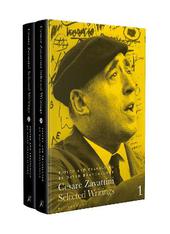
|
Cesare Zavattini: Selected Writings
Mixed media product
Main Details
| Title |
Cesare Zavattini: Selected Writings
|
| Authors and Contributors |
Edited by David Brancaleone
|
| Physical Properties |
| Format:Mixed media product |
|
| Category/Genre | Individual actors and performers
Individual film directors and film-makers |
|---|
| ISBN/Barcode |
9781501317187
|
| Classifications | Dewey:791.43092 |
|---|
| Audience | | Tertiary Education (US: College) | |
|---|
|
Publishing Details |
| Publisher |
Bloomsbury Publishing Plc
|
| Imprint |
Bloomsbury Academic USA
|
| Publication Date |
9 September 2021 |
| Publication Country |
United States
|
Description
Volume 1 makes available for the first time in English thirty-nine scenarios and two treatments. Each text is preceded by an introduction, providing an essential frame of reference to make these writings entirely accessible to the reader. While nearly all these texts belong to the post-war period, including the stories for major post-war classics, there are also seven pre-war raccontini, the narrative source of Zavattini's Modernist magical realism, several fictional interviews and faux reportage, tinged with irony aimed at Hollywood, complemented by several pre-war scenarios. The book also features scenarios for Luchino Visconti's Bellissima, Alessandro Blasetti's First Communion, De Sica's The Roof and texts encompassing Zavattini's ethnographic vision, from the redactions of Italia mia, interviews for Un paese, illustrated with Paul Strand's photographs, to the scenarios for investigative documentaries, including Why?, The Mysteries of Rome, The Guinea Pig, the Free Newsreel Revolution, and the lucid Before, During After, tackling Aldo Moro's assassination by the Red Brigades. The book includes Zavattini's last word on cinema and society, the testamentary satire La veritaaaa (1982), written, directed and acted by Zavattini himself. Each text is preceded by an introduction, providing an essential frame of reference to make these writings entirely accessible to the reader. Volume 2 brings to the fore Zavattini's ever-evolving internal dialogue between diary writer, screenwriter, narrative writer, and political activist. Essential to trace the origin of Zavattini's ideas on cinema and understand his theorization of Neo-realism is the inclusion of a selection of the filmmaker's pre-war writings. Most of the book provides a substantial anthology of texts translated from Neorealismo ecc. (1979), comprising Zavattini's major essays, conference papers, unpublished production papers, interviews, and vital excerpts from his correspondence and published cinematic diary. Through translation and detailed cultural and contextual commentary, translator and editor David Brancaleone traces not only Zavattini's theory of the screen, but also his experimentation in new film practices, including the flash-film (film lampo), the inquiry film (film inchiesta), cinema as encounter (cinema d'incontro), the diary film (film diario), the confessional film (film-confessione), and the grass-roots community film (cinema insieme or cinema di tanti per tanti). Each text is preceded by an introduction, providing an essential frame of reference to make these writings entirely accessible to the reader.
Author Biography
David Brancaleone is Lecturer in Critical and Contextual Studies, Limerick Institute of Technology, Ireland, where he teaches history and theory of art, film, photography and visual culture. An art history graduate from La Sapienza, Rome, he gained an MA in Italian Studies at University College London, UK and, in 2002, his doctorate at the Warburg Institute, University of London, UK. In 2019, he published the two-volume Zavattini, il Neo-realismo e il Nuovo Cinema latino-americano which reconstructs and documents Zavattini's cultural interventions in Latin America and his specific contribution to the global dimension of Neo-realism in the latter half of the twentieth century. This publication provided the critical and contextual basis for the curation of a major retrospective exhibition, 'Zavattini oltre i confini', Reggio Emilia, Italy, 2019.
ReviewsA thoroughgoing enemy of didacticism and a passionate advocate of the convergence of theory and praxis, radical thinker and experimenter with revolutionary ideas, promulgator of a truly novel cinema that continues to inspire filmmakers from all over the world, the oeuvre of the formidable Italian screenwriter, director, and theorist of neorealism is made available for the first time in the English language in these two finely translated and presented volumes. Zavattini's screenplays, articles, reports, papers, and letters, many of which never published before, disclose the true profundity and reach of his unique contribution to world cinema, and restore him to his rightful place in the intellectual history of the postwar decades. * Laura Rascaroli, Professor of Film and Screen Media, University College Cork, Ireland *
|